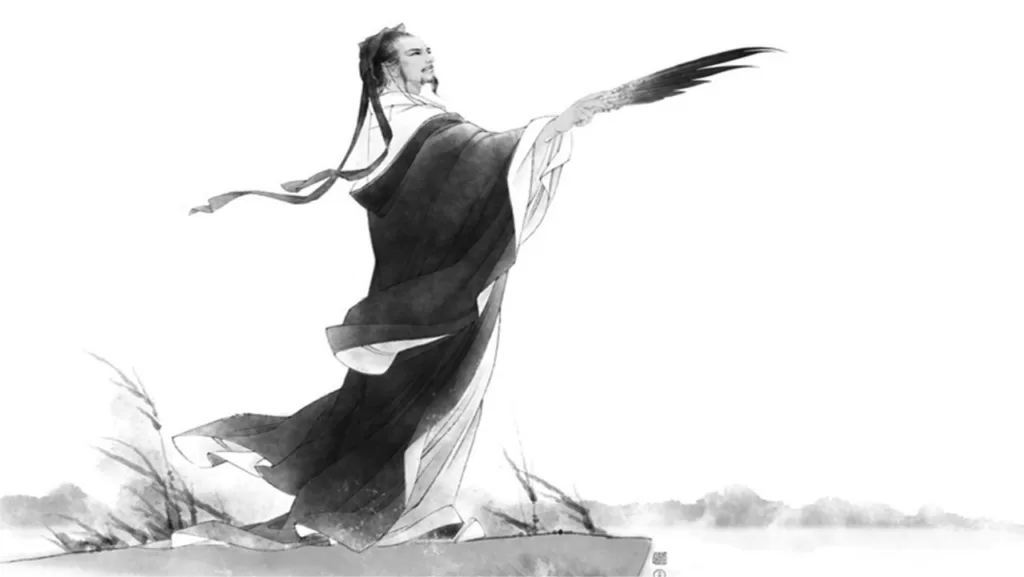Zhuge Liang (诸葛亮 181-234 CE), also known as Kongming, was a famous statesman, military strategist, and scholar in ancient China. He lived during the late Eastern Han dynasty and the Three Kingdoms period, and is renowned for his intelligence, strategic planning, and literary works. Zhuge Liang played a pivotal role in the establishment of the Shu Han state during the Three Kingdoms period, and is still revered as a symbol of wisdom and loyalty in Chinese culture today.
Early Life and Education:
Zhuge Liang was born into a family of scholars in the county of Langya (in present-day Yinan County, Shandong Province) during the Eastern Han dynasty. His father died when he was young, and he was raised by his mother and his elder brother. Zhuge Liang showed exceptional intelligence and curiosity from an early age, and became a voracious reader of books on various subjects, including history, philosophy, and military strategy. He was particularly interested in the works of the philosopher and strategist Sun Tzu, and became an expert in the art of war.
In his early twenties, Zhuge Liang moved to the northern region of China to study under the famous scholar and politician Sima Hui. Sima Hui recognized Zhuge Liang’s talent and took him as his protégé, teaching him the art of diplomacy, the principles of government, and the subtleties of human nature. Sima Hui also introduced Zhuge Liang to Liu Bei, a charismatic warlord who would later become his patron and ally.
Military Career:
In 207 CE, Liu Bei raised an army to launch a campaign against the tyrannical warlord Cao Cao, who controlled the central plains of China. Zhuge Liang joined Liu Bei’s army as a military advisor, and quickly distinguished himself with his strategic acumen and tactical brilliance. He devised a series of ingenious plans that enabled Liu Bei to defeat Cao Cao’s much larger and better-equipped army in several decisive battles, and to establish himself as a powerful warlord in his own right.
Over the next decade, Zhuge Liang served as Liu Bei’s chief advisor and strategist, helping him to expand his territories and to defeat his rivals. He also played a key role in Liu Bei’s campaigns against the other two major warlords of the time, Sun Quan and Yuan Shao. Zhuge Liang’s military genius was particularly evident in his use of deception, surprise, and psychological warfare to gain strategic advantages over his enemies.
In 221 CE, Liu Bei declared himself the Emperor of Shu Han, and Zhuge Liang became his prime minister. Zhuge Liang was tasked with governing the new state and defending it against the attacks of its powerful neighbors, Wei and Wu. He implemented a series of reforms that improved the administration, economy, and military of Shu Han, and launched several successful military campaigns that secured the borders and expanded the territory of the state.
Literary Works:
Zhuge Liang was not only a brilliant military strategist but also a prolific writer and scholar. He is credited with the authorship of several important works, including the “Master Sun’s Art of War”, a commentary on the classic text by Sun Tzu, and the “Thirty-Six Stratagems”, a collection of ancient Chinese military tactics and maxims. He also wrote poetry, essays, and treatises on various subjects, including philosophy, history, and governance.
Legacy:
Zhuge Liang died of illness in 234 CE, at the age of 54. His death was a great loss to Shu Han and to the world of Chinese culture and scholarship. He was posthumously awarded the title of “Marquis of Wuxiang”.
After his death, Zhuge Liang became a symbol of Confucian virtue and the ideal of the “scholar-general” in Chinese culture. His life and legacy were celebrated in many literary works, including the famous historical novel “Romance of the Three Kingdoms”, which portrays him as a master strategist and a wise counselor to Liu Bei. The novel also popularized many stories and legends about Zhuge Liang, including his invention of the “Kongming lantern” and his famous “Empty Fort Strategy” during the Battle of Wuzhang Plains.
Zhuge Liang’s influence was not limited to Chinese culture. He has also been admired by many foreign scholars and military leaders, including the Japanese samurai Miyamoto Musashi and the American general George Patton. His works on military strategy and leadership have been studied and applied by many people in various fields, from business to politics to sports.
In modern China, Zhuge Liang remains a popular figure, revered for his intelligence, integrity, and patriotism. His statue can be found in many parks, museums, and historical sites across the country, and his name is often used as a symbol of wisdom and strategic thinking. In 2014, a new high-speed train in China was named after Zhuge Liang, in honor of his contributions to Chinese culture and history.
Conclusion:
In conclusion, Zhuge Liang was a remarkable figure in Chinese history, whose intelligence, strategic vision, and literary talent have inspired generations of scholars, generals, and leaders. His legacy continues to influence and inspire people around the world, and his name will always be remembered as a symbol of wisdom and virtue in Chinese culture.

